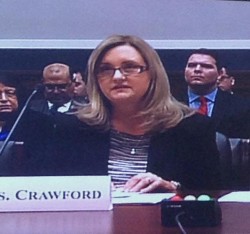UNAC/UHCP Member Testifies Before U.S. Congress
March 2015

UNAC/UHCP member Brenda Crawford, RN, spoke in favor of fairer union election procedures this week at a hearing in the US House of Representatives. Crawford, who along with her coworkers worked to form a union at her hospital in Southern California, told a House subcommittee March 4 that federal rules intended to make union election procedures more fair to workers should be allowed to take effect next month.
The National Labor Relations Board’s new rules for union elections “are modest changes, but necessary to ensure its elections are free and fair for workers,” Crawford testified before the House Subcommittee on Health, Employment, Labor, and Pensions. Crawford is now a UNAC/UHCP member as a registered nurse in the labor and delivery unit at Kaiser Riverside.
Crawford also testified last year before the NLRB in support of the new rules, which it said are designed to “streamline Board procedures, increase transparency and uniformity across regions, eliminate or reduce unnecessary litigation, duplication and delay, and update the Board's rules on documents and communications in light of modern communications technology.”
The rules, first proposed in 2011, are scheduled to go into effect April 14. But on the same day that Crawford testified, the Republican-controlled Senate voted 53-46 to reverse the board’s rulemaking decision. The House also is expected to block the rules from taking effect.
That’s why Crawford sat before the House subcommittee explaining the need for the new rules by citing her own experiences trying to build a union at Universal Health Systems Inc. in Murrieta, where she has been employed for the past 21 years.
“In 2013, I participated in an organizing drive to form a union with my fellow registered nurses,” she said. “A majority of the RNs signed cards supporting the union, and eventually the union filed an election petition. All we wanted was to have a fair opportunity to vote on whether or not to form a union.”
Unfortunately, she said, their efforts failed after the employer “ran a relentless anti-union campaign” that began even before workers filed an election petition. “My fellow nurses and I were taken off patient care constantly to attend anti-union meetings,” she noted, referring to just one of several examples of the union-busting tactics employed against the nurses.
“The company was able to manipulate the election procedure to delay the election date, and communicated with the workers in a way the union could not,” she testified. “I am sure that the election results did not reflect the RNs’ desire to join together to collectively bargain with our employer.”
